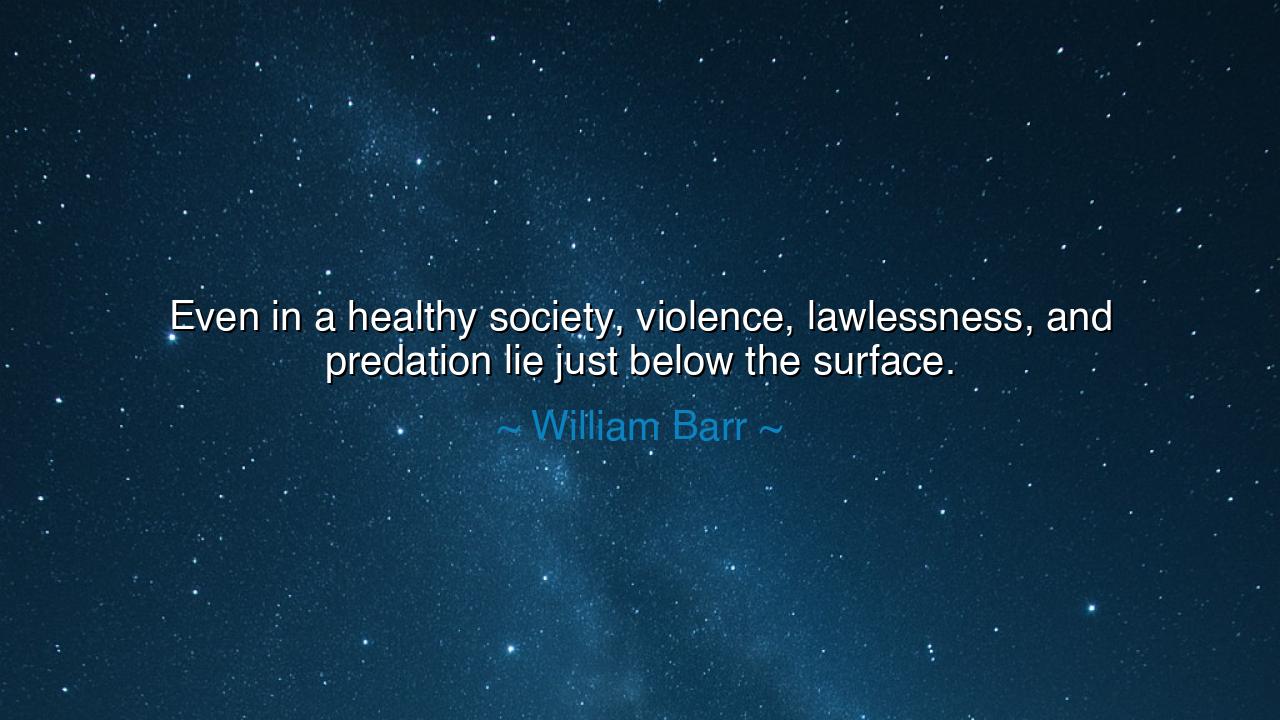
Even in a healthy society, violence, lawlessness, and predation
Even in a healthy society, violence, lawlessness, and predation lie just below the surface.






Hear the words of William Barr, who warned: “Even in a healthy society, violence, lawlessness, and predation lie just below the surface.” This is no idle thought, but a revelation carved from the marrow of history. For beneath the polished streets of civilization, beneath the ceremonies of order and the speeches of peace, there lingers a restless force, primal and raw. Barr reminds us that no matter how secure we imagine our world to be, the potential for violence and lawlessness remains, waiting for cracks in the foundation to emerge.
The origin of this saying comes from Barr’s role as a statesman, one tasked with watching over the fragile balance of law. In his years of service, he saw that even where governments function and institutions thrive, human passions—greed, envy, anger, and fear—can awaken suddenly, breaking through the thin veil of order. His words echo the wisdom of countless philosophers and leaders who understood that civilization is not a permanent fortress but a delicate garden, cultivated daily against the weeds of predation that threaten to overrun it.
The ancients, too, knew this truth. Consider the tale of Rome, mighty and disciplined, ruling lands from Britannia to the deserts of Africa. To its citizens, Rome seemed eternal, yet within its walls brewed corruption, unrest, and civil war. Gladiatorial games entertained the masses with blood, reminding them—consciously or not—that violence was always present, never far away. When famine struck, when leaders faltered, when soldiers marched against their own, the mask of order slipped, and chaos rose with terrifying swiftness. Rome fell not because violence was foreign, but because it had always lived beneath the surface, waiting to be unleashed.
So too in modern times, we recall the Los Angeles riots of 1992. For years, tensions simmered—poverty, injustice, anger against authority. On the surface, there was commerce, culture, daily life. But when the spark of outrage struck after the Rodney King verdict, order collapsed in flames. Neighbors turned upon neighbors, stores were looted, and the streets burned. It was proof, as Barr spoke, that even in a “healthy” society, all it takes is one fracture for the hidden forces of lawlessness to surge forth.
The meaning of Barr’s words, then, is not despair, but vigilance. To pretend that humanity has outgrown its darker impulses is folly; to deny their presence is to leave society unguarded. Instead, we must accept this truth with humility: that civilization is fragile, and must be tended constantly with justice, fairness, and accountability. When leaders ignore injustice, when communities neglect the bonds of trust, when people abandon the rule of law, then the surface cracks, and what lies beneath emerges with merciless strength.
What lesson shall we, who hear this teaching, take away? First, let us not grow arrogant in peace, imagining our order eternal. Second, let us strengthen the foundations of our societies by addressing injustice before it festers, by cultivating empathy before hatred blooms, by holding leaders accountable before corruption spreads. And third, let us each discipline ourselves, for the same forces that threaten nations live also within the individual heart. To master society, we must first master ourselves.
Therefore, children of the future, let this wisdom guide you: violence and lawlessness lie always near, but they need not rule you. By justice, compassion, and vigilance, you may keep them beneath the surface, never again to engulf the light of your communities. Remember always that peace is not the absence of danger, but the daily triumph over it. And when you guard that triumph with courage and wisdom, your society shall endure, even in the face of the restless darkness that lies below.






AAdministratorAdministrator
Welcome, honored guests. Please leave a comment, we will respond soon